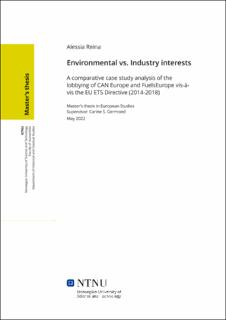| dc.contributor.advisor | Germond, Carine S. | |
| dc.contributor.author | Reina, Alessia | |
| dc.date.accessioned | 2023-07-11T17:28:46Z | |
| dc.date.available | 2023-07-11T17:28:46Z | |
| dc.date.issued | 2023 | |
| dc.identifier | no.ntnu:inspera:144932901:34409096 | |
| dc.identifier.uri | https://hdl.handle.net/11250/3078055 | |
| dc.description.abstract | Lobbyvirksomhet har i økende grad blitt en viktig del av beslutningsprosessen i Den europeiske union (EU). Samtidig har EU og interessegrupper aktive på EU-nivå økt sitt fokus og interesse for spørsmål knyttet til miljø-og klimaendringer betraktelig. Denne oppgaven spør hvordan Climate Action Network Europe (CAN Europe), som en diffus interesse som representerer miljøbevegelsen og FuelsEurope, som en spesifikk interesse som representerer oljeraffineriindustrien, har drevet lobbyvirksomhet under revisjonen av EU Emission Trade System (ETS) for fase IV. Oppgaven utforsker bruken av lobbystrategier og -taktikker under formulerings- og forhandlingsstadiene av EU ETS, og trekker på konsepter som extern-og internlobbying, lobbyvirksomhetsmål, bruken av Brussel og nasjonale kanaler, og lobbyvirksomhet rettet mot venner eller motstandere. Videre spør denne oppgaven i hvilken grad de brukte lobbystrategiene og taktikkene har gjort det mulig for de to interessegruppene å ha innflytelse på revisjonen av EU ETS. Denne studien er gjort gjennom dokumentanalyse, og utforsker hvordan de to interessegruppene drev lobbyvirksomhet ved å undersøke offentlig tilgjengelige dokumenter. Denne oppgaven bidrar til en bedre forståelse av hvordan CAN Europe og FuelsEurope drev lobbyvirksomhet under EU ETS-revisjonen og effektiviteten av deres lobbystrategier og taktikk brukt for å utøve innflytelse. Hovedfunnene tyder på at CAN Europe brukte et mer mangfoldig sett med lobbystrategier og taktikker enn FuelsEurope. Videre indikerer funnene at lobbystrategiene og -taktikkene som ble brukt av CAN Europe var mer effektive til å påvirke EU ETS enn lobbystrategiene og -taktikkene som ble brukt av FuelsEurope. | |
| dc.description.abstract | Lobbying has increasingly become a significant part of the European Union (EU) decision-making process. At the same time, the EU and interest groups active at the EU level have considerably increased their focus and interest in issues related to climate change and the environment. This thesis asks how Climate Action Network Europe (CAN Europe), as a diffuse interest representing the environmental movement and FuelsEurope, as a specific interest representing the oil refinery industry, have lobbied during the EU Emission Trade System (ETS) revision for phase IV. It explores the use of lobbying strategies and tactics during the formulation and negotiation stages of the EU ETS, drawing on concepts such as inside and outside lobbying, lobbying targets, the use of the Brussels and national channels, and the lobbying of friends and foes. Further, this thesis asks to what extent the used lobbying strategies and tactics have successfully enabled the two interest groups to wield influence on the EU ETS revision. This study is done through document analysis, exploring how the two interest groups lobbied by investigating publicly available documents. This thesis contributes to a better understanding of how CAN Europe and FuelsEurope lobbied during the EU ETS revision and the effectiveness of their lobbying strategies and tactics used to wield influence. The main findings suggest that CAN Europe used a more diverse set of lobbying strategies and tactics than FuelsEurope. Further, the discoveries indicate that the lobbying strategies and tactics used by CAN Europe were more effective in wielding influence on the EU ETS than the lobbying strategies and tactics used by FuelsEurope. | |
| dc.language | eng | |
| dc.publisher | NTNU | |
| dc.title | Environmental vs. Industry interests: A comparative case study analysis of the lobbying of CAN Europe and FuelsEurope vis-à-vis the EU ETS Directive (2014-2018) | |
| dc.type | Master thesis | |
